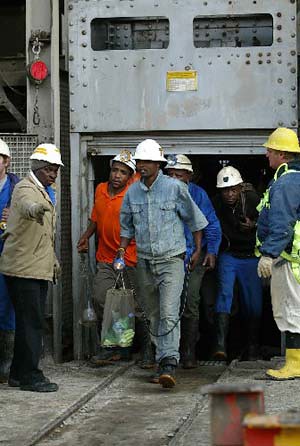
There is the constant possibility of strikes at the DeBeer's mines in South Africa, one the largest on the continent. The National Union of Mineworkers (NUM), an affiliate of COSATU, through a work stoppage could have a major impact on the world economy., a photo by Pan-African News Wire File Photos on Flickr.
February 8, 2012 6:02 pm
S Africa looks at ways to use mineral wealth
By Andrew England in Cape Town
South Africa could raise R40bn ($5.3bn) a year, at current commodity prices, through new taxes on the mining industry that could be used to establish a sovereign wealth fund, according to a report commissioned by South Africa’s ruling African National Congress.
The proposals in the report, which looks at greater state intervention in the mining sector, are among a series of wide-ranging recommendations – including a 50 per cent resource rent tax – analysing how South Africa could better use its mineral wealth to drive development and alleviate poverty and unemployment.
The report does not represent government or ANC policy. But it will be tabled at a critical ANC policy conference in June as elements of the ruling alliance, which includes powerful unions, push for greater state intervention in Africa’s largest economy.
Other proposals include union and state pension funds combining their holdings in mining companies into a special purpose vehicle (SPV) to increase their influence in the industry.
“For strategic minerals, where majority state control might be necessary, this holding could be increased to a controlling holding,” a copy of the report obtained by the FT says. “But this will require compensation at market value.”
It also recommends intervention to ensure local companies have access to minerals as the government looks to tackle unemployment and boost a flagging manufacturing sector.
If the proposals were adopted, a potential target could be ArcelorMittal, which receives iron ore from the Kumba mine at a preferential rate and supplies about three quarters of South Africa’s steel.
“We urgently need to facilitate the establishment of a new steel operator” to sell into the domestic market at a competitive price to force ArcelorMittal to drop its prices, the report says.
It adds that the ANC should request Cosatu, the trade union federation that is part of the governing alliance, “to consider using its influence over [union pension] fund managers to form a controlling SPV” with the state in Sasol, the petrochemicals group, which supplies polymers.
South Africa boasts the world’s fifth largest mining sector by value. It accounts for about 7 per cent of South Africa’s gross domestic product, employs 500,000 people and hosts about half of the world’s top 20 mining companies.
The report ruled out the nationalisation of mines, a move welcomed by mining officials. But executives detect a shift towards resource nationalism. There are also concerns that policy uncertainty, blamed for stymieing investment in the industry which has underperformed its peers throughout the commodity boom, will continue to plague the sector.
“What we don’t like as businessmen is when there is policy uncertainty, lack of consistency and goal posts appear to be moving, and I think that’s the situation South Africa, as a mining industry, still finds itself in,” said Ian Farmer, chief executive of Lonmin, platinum miner.
“Also, what worries business is the state tends to default to an interventionist approach, yet the state’s capacity to implement those interventions is not proven to be the best, therefore it’s playing to its own weakness.”
The report, however, says that under the current fiscal regime “our nation is clearly not getting a fair share of resource rents generated from its mineral assets.”
It says the resource rent tax would be triggered after a “normal return” has been achieved, which it states should be defined as “our Treasury long bond rate plus 7 per cent [about 15 per cent currently].”
However, it also says a putative carbon tax as proposed by the Treasury could be extremely damaging to the economy and should be put on hold.
The report’s proposals will be discussed at the ANC’s branch levels in the lead-up to the June policy conference. Mining executives hope they will also be engaged in debate, although the relationship between government and private sector is often characterised as one of mistrust.
“I think there’s a more comfortable view on nationalisation, but I’m not sure everybody has fully internalised the desire of the state to intervene more extensively and comprehensively,” said Martin Kingston, CEO of Rothschild South Africa.
No comments:
Post a Comment